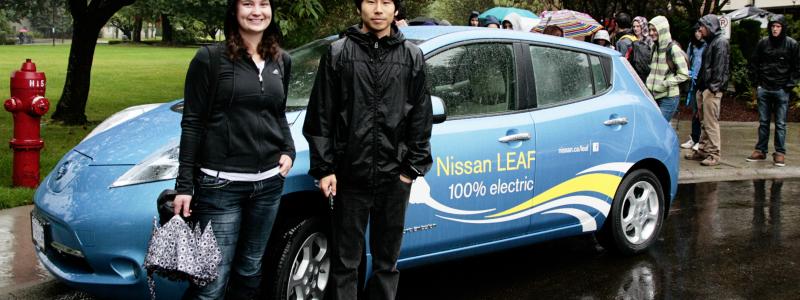On a rainy Thursday morning, a group of first-year Trinity Western University students from the Global Environmental Issues class stepped into the new zero-emissions Nissan LEAF to drive to their field study site. Fortunately it wasn’t a solar-powered car. Instead, they were test driving the not-yet-available electric-powered car, and thereby reducing the ecological footprint of their travel.
“I expected that the car would be sluggish since it is electric, but I was totally wrong. It performs as well or even better than a car in the same size class,” said Dennis Kim, a second-year Intercultural Religious Studies major.
When short a car for the carpool to the field studies site, “it occurred to me that there might be the opportunity for a synergy between a vendor of a hybrid and TWU’s Global Environmental Issues class,” said Geraldine Jordan, Ph.D., Assistant Professor, Geography and Environmental Studies. Upon her inquiry with Jonker Auto Group, the owner Karel Jonker kindly offered her something even better than a hybrid: the zero-emission LEAF by Nissan.
In TWU’s Global Environmental Issues class one of the course objectives is to provide students with perspectives in solving environmental problems rather than just understanding how they arise. Human impact on the biosphere is overwhelming in scale and scope. Each year, across the globe, outdoor air pollution is estimated to contribute to over a million premature human deaths (see World Health Organization news). Thus, finding ways to reduce air pollution is of paramount importance.
“One of our topics is urban air pollution and, of course, the increasing use of electric cars is one way to reduce outdoor urban air pollution,” said Jordan, “When electricity is from a renewable resource, like hydro in B.C., the use of electric cars also is one way to reduce greenhouse gas emissions. Students in this course learn that reducing greenhouse gas emissions produced by the transportation sector contributes to curbing anthropogenic climate change.”
The vehicle offers 160 kilometers per full battery charge. “After playing around with the controls and features on the car, the usage was going up and I could see that I had less mileage left,” said Kim. The rear roof of the car has an added solar panel the helps to recharge the battery to compensate for peripheral usage. “I honestly started to get attached to the car. The driving experience exceeded my expectations,” he said.
The Nissan LEAF, also known as World Car of the Year, is a technologically advanced electric car with on-board computer monitoring of energy use. The vehicle is almost silent because there is no internal combustion engine. More significantly, there are no local emissions from driving the car because there is no tailpipe.
The Geography Program expresses its sincere thanks to Mr. Jonker and the Jonker Auto Group for their generosity in providing this opportunity to TWU’s GEOG/ENVS 131 class.

